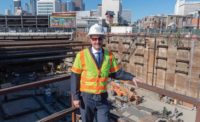

An investigation is pending into cracks detected in more than 200 buildings in Chennai, India. While they are attributed to the construction of the first phase of the 90-kilometer-long, $3-billion Chennai Metro project, it is not clear whether the tunnel boring machines (TBMs) are the direct cause.
Administered by Chennai Metro Rail Ltd (CMRL), a joint venture between the Indian government and the southern state of Tamil Nadu, the project's first phase is to be completed by spring 2015. It will have two corridors with a combined length of 45 km. The underground section will be 24 km long with 19 stations. Delhi Metro Rail Corp. (DMRC), prime consultant for the first phase, will assist CMRL in an advisory role in the execution of the project.
The fact that 70% of the buildings that developed the cracks were very old could not be ruled out, a structural engineer close to the project told ENR. “The metro was built all over Delhi, including close to very old heritage buildings, and there were no incidents … however, it could have been a design failure. One cannot rule out negligence for not ensuring a minimum cone of influence,” he says.
India's Larsen & Toubro, in joint venture with Shanghai Urban Construction Group, won one of the first contracts for design and construction of 3.3-km-long twin tunnels and three stations. The team's chief general manager, S. Krishnamoorthy, said crews were careful plugging old bore wells and all monitored buildings during tunneling around the clock. The TBMs averaged six to 10 meters a day.
The project brief was “based on a detailed evaluation, experience and internationally accepted practices,” according to a CMRL brief. For the underground sections, the brief states that rail level at the mid-section in tunneling must be kept at least 12 m below ground level so that a cover of 6 m is available over the tunnels.
“Incidents of cracks are largely unavoidable in such large-scale construction, particularly in congested areas where known methods of strengthening cannot be carried out," S. R. Gandhi, head of the Dept. of Civil Engineering at the Indian Institute of Technology (IIT) Chennai, was quoted in a local daily. “It is certainly challenging to carry out tunneling in Chennai's soil conditions, which is a coastal region with large variations and occasional soft marine clay layers,” Gandhi added.
Federal Minister for Urban Development Kamal Nath clarified the issue in parliament recently, saying that as part of precautionary measures, strengthening and even temporary evacuation was being done for structurally weak buildings to ensure safety. “In the event of significant impact on any building, the repair works are undertaken based on the recommendations given by the experts from IIT, Chennai,” Nath added.

